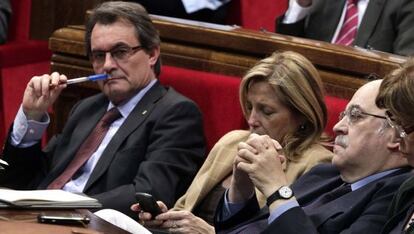Catalan premier called to court over 2014 informal independence vote
Artur Mas is an official target in a probe opened by prosecutors over last year’s referendum


Catalan premier Artur Mas and two of his aides have been called in to testify as official targets of an investigation into an informal referendum on independence that was held on November 9, 2014.
The Superior Court of Justice of Catalonia (TSJC) is investigating whether Mas, his former deputy Joana Ortega and education commissioner Irene Rigau committed any crimes by organizing a vote that Madrid considered illegal.
In late November, state prosecutors brought charges of serious disobedience, breach of public duty, embezzlement and usurpation of powers against Mas.
If tried and found guilty of disobedience, Mas could be barred from holding office anywhere between six months and two years
The informal vote on self-rule yielded a majority support for independence, but it was considered of little value by outside observers because of the way it was organized. Mas claimed that Madrid did not allow him to hold a legal referendum, and that he was thus forced into organizing the proxy vote.
The charges were brought by the chief attorney in Catalonia on orders of Attorney General Eduardo Torres-Dulce, despite the former being personally opposed to such a move.
The move to prosecute was itself the subject of heated debate at the time, with some observers claiming that it was politically motivated and instigated by the ruling Popular Party (PP), which vehemently opposes Catalan independence.
The Catalan premier will make his deposition on October 15.
If tried and found guilty of disobedience, Mas could be barred from holding office anywhere between six months and two years. The other crimes also entail a prohibition to hold public positions for up to 10 years.
On Sunday, Catalonia held parliamentary elections that Mas billed as a de facto referendum on independence. His pro-independence Junts pel Sí alliance won a majority of seats but not of votes.
English version by Susana Urra
Tu suscripción se está usando en otro dispositivo
¿Quieres añadir otro usuario a tu suscripción?
Si continúas leyendo en este dispositivo, no se podrá leer en el otro.
FlechaTu suscripción se está usando en otro dispositivo y solo puedes acceder a EL PAÍS desde un dispositivo a la vez.
Si quieres compartir tu cuenta, cambia tu suscripción a la modalidad Premium, así podrás añadir otro usuario. Cada uno accederá con su propia cuenta de email, lo que os permitirá personalizar vuestra experiencia en EL PAÍS.
¿Tienes una suscripción de empresa? Accede aquí para contratar más cuentas.
En el caso de no saber quién está usando tu cuenta, te recomendamos cambiar tu contraseña aquí.
Si decides continuar compartiendo tu cuenta, este mensaje se mostrará en tu dispositivo y en el de la otra persona que está usando tu cuenta de forma indefinida, afectando a tu experiencia de lectura. Puedes consultar aquí los términos y condiciones de la suscripción digital.








































